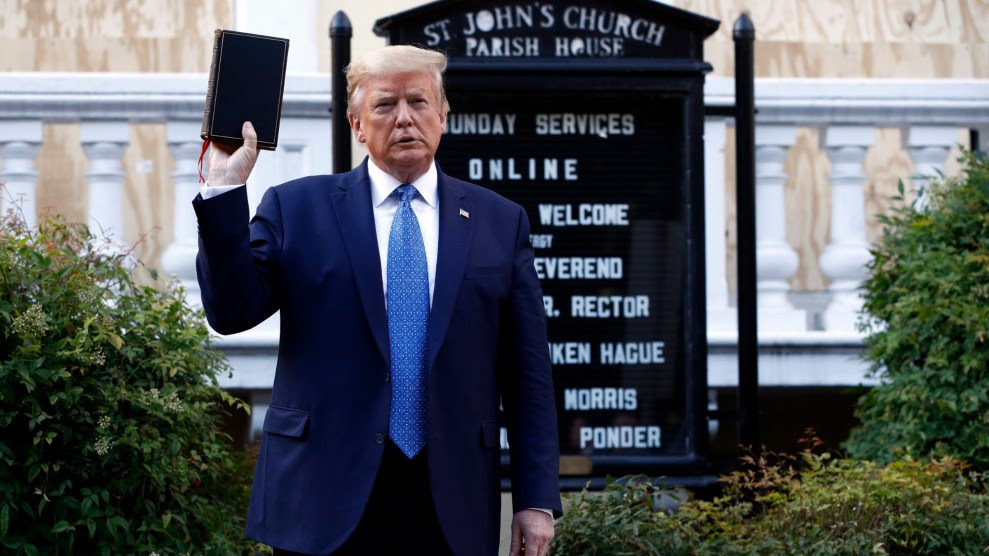What's up, Doc?
Eighty years ago today, the character of Bugs Bunny was officially introduced with the release of the Warner Bros. short film A Wild Hare. Elmer Fudd, it turns out, is a really lousy wabbit hunter. What a fool. Watch the film here. (Spoiler: Bugs gets away.)
That's all folks!
—Abigail Weinberg

"An unprovoked escalation" before a Trump photo op.
BY DAN FRIEDMAN

BY WILL PEISCHEL
BY REBECCA LEBER
BY BEN DREYFUSS
BY DAN SPINELLI

It's no accident that the most polluted communities are also the most likely to have more severe cases of COVID-19.
BY REBECCA LEBER

SOME GOOD NEWS, FOR ONCE
I’d never really been a proud American—until Donald Trump was elected president. Let me explain.
By the time I understood what it meant to be American (besides being able to buy a Coca-Cola sweater and Guess jeans in middle school), I was tuning in to Ronald Reagan talk about “trickle-down” economics. Even as a preteen, I knew that “trickle down” as an economic policy sounded suspiciously off. I now know it was delusional.
In college and law school, when I was in India or anywhere other than the United States, I would go along with the standard conversations: “Yes, Americans are embarrassing”; “Yes, the US government has caused tremendous harm across the globe”; “Yes, many Americans are racist”—feeling relief and superiority in my ability to use my Indian heritage as a way to deny my American identity. Looking back, my embarrassment about America was in part a reflection of how I felt in this country.
As I grew up, I constantly walked a tightrope of acceptance and rejection—of being seen and not—in everything I did. I hated that tightrope and the elements of the country that created it.
When Barack Obama was elected president in 2008, I exhaled a sigh of relief. Electing a Black president—now there’s something to be proud of. As elated as I was, I still felt like Obama won in spite of Americans, not because of them. I was proud of President Obama and his family, but still very suspicious of America.
On November 9, 2016, the day after Donald Trump was elected, I was openly crying at work, my stomach in a permanent double knot. I kept asking “Why?” and “How could this happen?” My feet wanted to walk, but I had nowhere to go. A whole-body shutdown.
Now I know why. The election of Trump broke my heart. It turns out I had loved the United States from the beginning. The fact that America was not enthusiastically ready to love me or the people I love back made my feelings easy to ignore. There is a lot of pain in loving something so flawed—a country so far from what it aspired to be and what it could be.
To love my country is not to unconditionally accept it; it means working toward what is just. Because I love America and Americans, I am willing to fight to make the idea of America real, make democracy real, make justice real. I will not give in to cynicism or anger, and I will not give up. During his presidential bid, Sen. Cory Booker said, “If America hasn’t broken your heart, you don’t love [America] enough.” On November 9, 2016, my heart was hammered into small pieces, and I knew I loved America more than ever.
Rep. John Lewis’ legacy is a guiding light: America, you’re mine and I’m yours. Let’s create our beloved community, till death do us part.
—Venu Gupta
On this July 7, Ringo Starr, née Richard Starkey, best known for narrating Thomas the Tank Engine, turns 80 years old.
Boy, have we got a stellar trove of reporting for you today. Our Washington, DC, bureau chief, David Corn, picks apart Trump's racist antics; fellow Will Peischel dives into the heartbreaking Facebook group where doctors process their coronavirus grief; tech reporter Ali Breland and environmental reporter Rebecca Leber team up to explain Facebook's failure to deal with lies about climate change; reporter Hannah Levintova dishes on the #BuyBlack movement's successes and shortcomings; and reporter Kara Voght reveals the Democratic senatorial candidate who has raised an enormous sum of money in his campaign to unset Lindsey Graham. Whew!
As Ringo, the only surviving Beatle personally active on Twitter, would say: "Peace and love everybody stay safe be coolBe kind and loving peace -and love love."
—Abigail Weinberg

Slipping in the polls, Trump ratchets up the racism.
BY DAVID CORN

BY WILL PEISCHEL
BY REBECCA LEBER AND ALI BRELAND
BY HANNAH LEVINTOVA
BY KARA VOGHT

Your favorite July 4th treat is a lie.
BY ALI BRELAND

SOME GOOD NEWS, FOR ONCE
The family-run Piedmont Piano Company in Oakland just announced a weekly series of livestreams with some of the brightest and most innovative musicians in the Bay Area and beyond. Most recently, the Pit Orchestra playing Monk, with pianist Edward Simon, trumpeter Erik Jekabson, and bassist Peter Barshay. Down the calendar: Howard Wiley’s must-catch tribute to Sonny Rollins’ Freedom Suite. (Reading my interview with Rollins about the pandemic, protests, and creative change, if you missed it.) Also in the mix: Stella Heath, Rob Reich, and Daniel Fabricant. Berkeley-born Wiley is especially energizing and inspiring. At age 12, he headlined the old Koncepts Cultural Gallery—founded by Edsel Matthews—then Festival by the Bay in Richmond, a historic cultural center, and two years later was headlining Yoshi’s.
Mark the calendar for Wiley’s spin on Thursday, July 16. More details here, and drop me a line at recharge@motherjones.com for deeper dives into the sounds of solidarity, stamina, and resilience—and send me your own tips for livestreams across the map.
—Daniel King






No comments:
Post a Comment